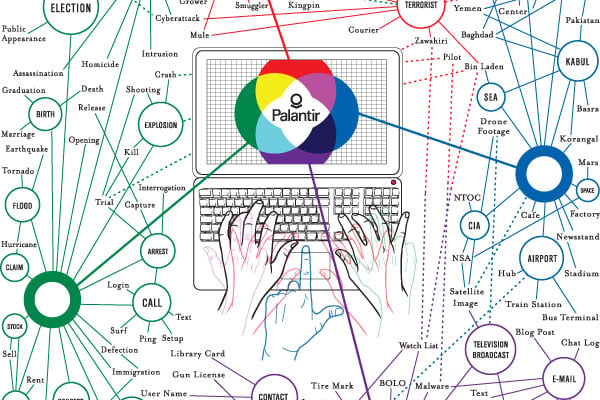WATCHING YOU: Your data. Peter Thiel’s sticky fingers. What could go wrong? “Palantir Knows Everything About You,” by Bloomberg’s Peter Waldman, Lizette Chapman and Jordan Robertson.
Palantir Knows Everything About You Bloomberg see more below
SCRUTINY: A federal judge is threatening to appoint a “private prosecutor” to press a criminal investigation about FBI leaks to the press in an insider trading case
The World’s 50 Greatest Leaders – “Though it seems unlikely, Tim Cook and Indira Jaising have something in common besides membership in Fortune’s 2018 ranking of the World’s Greatest Leaders. Cook (No. 14) is the wealthy CEO of Apple, the most valuable publicly traded company on earth; Jaising (No. 20) is an Indian lawyer who cofounded an NGO called Lawyers Collective, which promotes human rights issues. Yet they share this trait: Both have multiplied their organizations’ effectiveness by harnessing the power of unbundling. Following their example is a new imperative for the best leaders. Unbundling means disaggregating enterprises of all kinds, from the smallest startups to entire nations. In business it can mean making a company more valuable by splitting it up, as Hewlett-Packard did and other companies (Honeywell, Pentair, DowDuPont) are doing. Or it can mean increasing value by delegating functions once regarded as necessary parts of the whole; Apple’s outsourcing of complex, high-tech manufacturing, and the staggering capital requirements that go with it, is a dramatic example. Technology makes unbundling possible and often inevitable.
Peter Thiel’s data-mining company is using War on Terror tools to track American citizens. The scary thing? Palantir is desperate for new customers.
“Founded in 2004 by Peter Thiel and some fellow PayPal alumni, Palantir cut its teeth working for the Pentagon and the CIA in Afghanistan and Iraq. The company’s engineers and products don’t do any spying themselves; they’re more like a spy’s brain, collecting and analyzing information that’s fed in from the hands, eyes, nose, and ears. The software combs through disparate data sources—financial documents, airline reservations, cellphone records, social media postings—and searches for connections that human analysts might miss. It then presents the linkages in colorful, easy-to-interpret graphics that look like spider webs. U.S. spies and special forces loved it immediately; they deployed Palantir to synthesize and sort the blizzard of battlefield intelligence. It helped planners avoid roadside bombs, track insurgents for assassination, even hunt down Osama bin Laden. The military success led to federal contracts on the civilian side. The U.S. Department of Health and Human Services uses Palantir to detect Medicare fraud. The FBI uses it in criminal probes. The Department of Homeland Security deploys it to screen air travelers and keep tabs on immigrants.Police and sheriff’s departments in New York, New Orleans, Chicago, and Los Angeles have also used it, frequently ensnaring in the digital dragnet people who aren’t suspected of committing any crime. People and objects pop up on the Palantir screen inside boxes connected to other boxes by radiating lines labeled with the relationship: “Colleague of,” “Lives with,” “Operator of [cell number],” “Owner of [vehicle],” “Sibling of,” even “Lover of.” If the authorities have a picture, the rest is easy. Tapping databases of driver’s license and ID photos, law enforcement agencies can now identify more than half the population of U.S. adults…”
Founded in 2004 by Peter Thiel and some fellow PayPal alumni, Palantir cut its teeth working for the Pentagon and the CIA in Afghanistan and Iraq. The company’s engineers and products don’t do any spying themselves; they’re more like a spy’s brain, collecting and analyzing information that’s fed in from the hands, eyes, nose, and ears. The software combs through disparate data sources—financial documents, airline reservations, cellphone records, social media postings—and searches for connections that human analysts might miss. It then presents the linkages in colorful, easy-to-interpret graphics that look like spider webs. U.S. spies and special forces loved it immediately; they deployed Palantir to synthesize and sort the blizzard of battlefield intelligence. It helped planners avoid roadside bombs, track insurgents for assassination, even hunt down Osama bin Laden. The military success led to federal contracts on the civilian side. The U.S. Department of Health and Human Services uses Palantir to detect Medicare fraud. The FBI uses it in criminal probes. The Department of Homeland Security deploys it to screen air travelers and keep tabs on immigrants.
Chart on Admissibility of Electronic Evidence Craig Ball posted a well documented chart, Admissibility of Electronic Evidence, authored by U.S. District Judge Paul Grimm and attorney Kevin Brady. Thanks to all for sharing!
THE 77-YEAR-OLD GANGBANGER: Chicago’s gang
database is full of errors. ProPublica Illinois’ Mick Dumke explores the
128,000 people gathered in the database, which
seems to be more of a racial profiling mechanism. (Hat tip: Adriana
Gallardo)
